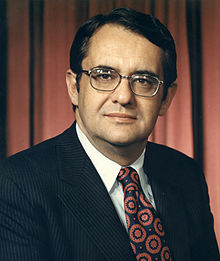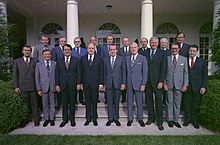Peter G. Peterson
Peter G. Peterson | |
|---|---|
 | |
| Chairman of the Council on Foreign Relations | |
| In office September 1, 1985 – June 30, 2007 | |
| Preceded by | David Rockefeller |
| Succeeded by | Carla Hills Robert Rubin |
| 20th United States Secretary of Commerce | |
| In office February 29, 1972 – February 1, 1973 | |
| President | Richard Nixon |
| Preceded by | Maurice Stans |
| Succeeded by | Frederick B. Dent |
| Personal details | |
| Born | Peter Petropoulos[1] June 5, 1926 Kearney, Nebraska, U.S. |
| Died | March 20, 2018 (aged 91) New York City, U.S. |
| Political party | Republican |
| Spouses | Kris Krengel
(m. 1948; div. 1950)Sally Hornbogen
(m. 1953; div. 1979) |
| Children | 5, including Holly |
| Education | Northwestern University (BA) University of Chicago (MBA) |
Peter George Peterson (June 5, 1926 – March 20, 2018) was an American investment banker who served as
Early life and education
Peterson was born in
Business career
Peterson joined advertising agency
In 1969, he was invited by philanthropist
United States Secretary of Commerce (1972–73)

In 1971, he was named assistant to the president for international economic affairs by U.S. President Richard Nixon.[1] In April 1971, Peterson produced a secret report for Nixon on the volatile world economy that argued that the U.S. was in economic decline under the existing world order of trade, which the U.S. had helped build immediately after World War II. To stem that decline, according to Peterson, the U.S. must challenge competing nations in the trading sphere by adopting industrial policy. The report impressed Nixon and the idea of American competitive decline soon became "an article of popular belief". The report established some of the intellectual foundations of Nixon's decision in August 1971 to upend the Bretton Woods agreement. Professional economists derided the thesis as a form of mercantilism that betrayed "economic illiteracy".[12]
In 1972, Peterson became Secretary of Commerce, a position he held for one year.[2] At that time he also assumed the chairmanship of Nixon's National Commission on Productivity and was appointed U.S. Chairman of the U.S.–Soviet Commercial Commission.[2] During his tenure, Peterson was a strong critic of the rising financial debt of the United States.[1]
Post-Washington career
Peterson was chairman and CEO of
In 1985, Peterson and
Clinton presidency
In 1992, he was one of the co-founders of the Concord Coalition, a bipartisan citizens' organization that advocates reduction of the federal budget deficit.[17] Following record deficits under President George W. Bush, Peterson said in 2004, "I remain a Republican, but the Republicans have become a far more theological, faith-directed party, not troubling with evidence."[17]
In February 1994, President
Later career
Peterson succeeded David Rockefeller as chairman of the Council on Foreign Relations in 1985 and served until his retirement from that position in 2007.[5] He served as trustee of the Rockefeller family's Japan Society and of the Museum of Modern Art, and was previously on the board of Rockefeller Center Properties, Inc.[5][4]
He was the founding chairman of the Peterson Institute for International Economics (formerly the "Institute for International Economics", renamed in his honor in 2006), and a trustee of the Committee for Economic Development.[5] He was also chairman of the Federal Reserve Bank of New York between 2000 and 2004.[5]
In 2008, he founded the
Peterson funded
On August 4, 2010, it was announced that Peterson had signed "The Giving Pledge". He was one of 40 billionaires, led by Bill Gates and Warren Buffett, who agreed to give at least half their wealth to charity.[19] Most of his giving was to his own foundation, The Peter G. Peterson Foundation, which focuses on raising public awareness about long-term fiscal sustainability issues.[2]
Political activities
From 2007 through 2011, Peterson was reported to have contributed $458 million to the
Peterson opposed the Tax Cuts and Jobs Act of 2017 because it cut corporate and other taxes by raising the debt. "Mortgaging our fiscal future for trillions in temporary tax cuts will hurt our economy over time, and every C.E.O. should know that", he said. "True business patriots need to advocate for their country as well as their company."[21]
Personal life
Peterson was married three times and divorced twice.[3] In 1953, he married former Brown University psychology professor Sally Hornbogen Peterson, a trustee of the Dalton School and a graduate of Northwestern University, with whom he had five children: John Scott Peterson, James Jim Peterson, David Peterson, Michael Alexander Peterson,[7] and the writer Holly Peterson.[22][23] They divorced in 1979.[22] The next year, Peterson married Joan Ganz Cooney, the co-creator of the popular American educational children's television series Sesame Street.[24]
In his autobiography, Peterson recalled his business and private life and blamed himself for the failure of two of his three marriages but expressed pride for having grown close to his children.[25]
Peterson died on March 20, 2018, at age 91, of natural causes at his Manhattan home.[1][2][3] He is survived by his children, his wife Joan, and nine grandchildren.
Honors
In 1962, Peterson received the Golden Plate Award of the American Academy of Achievement.[26]
In recognition of his support, the influential[27] Peterson Institute for International Economics was named in his honor in 2006.[5]
In 2006, Peterson was honored with the Woodrow Wilson Award for Corporate Citizenship by the Woodrow Wilson International Center for Scholars of the Smithsonian Institution.[1] The same year he was elected a fellow of the American Academy of Arts and Sciences.[20]
Writings
- "Why I’m Giving Away $1 Billion", Newsweek, May 30, 2009
- "You Can't Take It with You", Newsweek, April 7, 2008
- "Old habits must change", The Banker, 3 January 2005
- Articles published in "Foreign Affairs" 1994–2004.
Books
- Facing Up: How to Rescue the Economy from Crushing Debt and Restore the American Dream. Simon & Schuster; First Edition (November 8, 1993). ISBN 978-0-671-79642-6
- Will America Grow up Before it Grows Old: How the Coming Social Security Crisis Threatens You, Your Family and Your Country. Random House; 1 edition (October 8, 1996). ISBN 978-0-679-45256-0
- Gray Dawn: How the Coming Age Wave Will Transform America—and the World. Three Rivers Press (September 26, 2000). ISBN 978-0-8129-9069-0
- On Borrowed Time: How the Growth in Entitlement Spending Threatens America's Future with Neil Howe. Transaction Publishers (May 1, 2004). ISBN 978-0-7658-0575-1
- Running on Empty: How the Democratic and Republican Parties Are Bankrupting Our Future and What Americans Can Do About It. Picador (June 16, 2005). ISBN 978-0-312-42462-6
- The Education of an American Dreamer: How a Son of Greek Immigrants Learned His Way from a Nebraska Diner to Washington, Wall Street, and Beyond. Twelve (June 8, 2009). ISBN 978-0-446-55603-3
References
- ^ Washington Post.
- ^ a b c d e f g h i j k l m n o p "Peter G. Peterson, a Power From Wall St. to Washington, Dies at 91". The New York Times. March 20, 2018. Retrieved March 20, 2018.
- ^ a b c d "Greek-American Billionaire Peter G. Peterson Passed Away at 91". The National Herald. 22 March 2018. Archived from the original on 25 March 2018. Retrieved 24 March 2018.
- ^ a b c d e f g h "Peter Peterson, Blackstone Co-Founder, Dies At 91". The Wall Street Journal. March 20, 2018. Retrieved March 20, 2018.
- ^ a b c d e f g h "Pete Peterson, Lehman Exile, Blackstone Billionaire, Dies at 91". Bloomberg. March 20, 2018. Retrieved March 20, 2018.
- ^ "Resource Library Search". www.pgpf.org.
- ^ a b "Peter G. Peterson". NNDB.
- ISBN 9780379120905.
Peter Peterson Kearney Nebraska.
- ^ "Peterson Chair in Corporate Ethics established". Northwestern University.
- ISBN 978-0446556033.
- ^ "Peter G. Peterson". Richard Nixon Presidential Library and Museum. Archived from the original on 2018-03-21. Retrieved 2012-10-30.
- OCLC 37975682.
- ISBN 1-58567-088-X[page needed]
- ^ David Carey & John E. Morris, King of Capital: The Remarkable Rise, Fall and Rise Again of Steve Schwarzman and Blackstone, (Crown 2010), pp. 45–56
- ^ Blackstone IPO Prospectus
- ^ King of Capital, p. 5
- ^ a b Robert Kuttner (December 26, 2004). "What Killed Off The GOP Deficit Hawks?". Bloomberg.
- ^ Bryan Bender, Movement warns of US bankruptcy, Seeks support for overhaul of federal budget, The Boston Globe, July 10, 2008.
- ^ "Peterson".
- ^ a b Grim, Ryan; Blumenthal, Paul (May 15, 2012). "What Half A Billion Dollars Buys You In Washington". Huffington Post.
- ^ C.E.O. Deficit Fears Dissolve With the Prospect of Corporate Tax Cuts. By ANDREW ROSS SORKIN. New York Times. NOV. 20, 2017
- ^ ISBN 978-0313325946.
- ISSN 0362-4331. Retrieved 2015-10-14.
- ^ "Answers - The Most Trusted Place for Answering Life's Questions". Answers.
- ^ Hurt, Hary (June 20, 2009). "Go East, Young Man, and Make Your Fortune". The New York Times. Retrieved October 30, 2012.
- American Academy of Achievement.
- ^ James G. McGann (Director) (January 20, 2012). "The Global Go To Think Tank Report, 2011" (PDF). Think Tanks and Civil Societies Program, University of Pennsylvania. Archived from the original (PDF) on December 31, 2013. Retrieved June 13, 2014.
External links
- Biography from Blackstone Group
- The Concord Coalition biography
- Brandt 21 Forum biography
- Hess, John L. (March–April 1997). "A Crusader in Clover". Extra!. Fairness and Accuracy in Reporting. Retrieved October 30, 2012.
- "Transcript: Conversation with a Conservative: Peter G. Peterson". Mother Jones. October 26, 2004. Retrieved October 30, 2012.
- "Transcript: Bill Moyers Interviews Peter Peterson". NOW on PBS. September 26, 2003. Retrieved October 30, 2012.
- "The Tri-Deficits: Why They Matter and What to Do About Them". John F. Kennedy Jr. Forum. October 5, 2005. Archived from the original on July 18, 2013. Retrieved October 30, 2012.
- Audio-Interview with Peter Peterson by German Journalist Wolfgang Blau, a.k.a. Harrer, Deutsche Welle, November 2004 (English interview with short German intro)
- Pete Peterson on Charlie Rose (PBS), 1994–2009.
- A Conversation with Peter Peterson at charlierose.com
- I.O.U.S.A.: The Movie a Peter G. Peterson Foundation-supported documentary
- A film clip "The Open Mind – After the Fall (1987)" is available for viewing at the Internet Archive
- A film clip "The Open Mind – "The Wealth of Nations" (2008)" is available for viewing at the Internet Archive
- Krugman's views on Peterson's efforts with the national debt
- Appearances on C-SPAN

